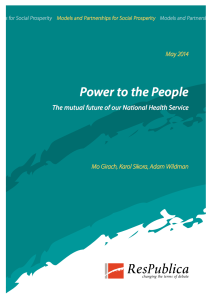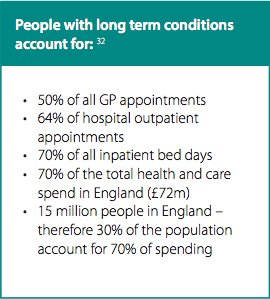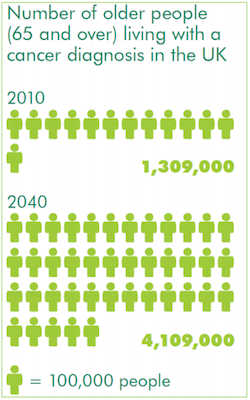
I began Conservative conference last Monday with a discussion hosted by ResPublica about empowering patients. The background was the report Power to the People – the mutual future of our National Health Service (PDF) produced for health mutual benenden.
The report deals with the underlying reasons why the NHS is struggling to cope despite this Government protecting overall health spending and our Party pledging to protect it once again. Take a look at the Budget Red Book 2014 and you will see (page 61) that the health budget is increasing substantially in cash terms: the NHS is wrestling to cope with a reduced rate of increase. Why and what is to be done about it?
The report begins by explaining that drastic reform is required if the NHS is to remain viable. The related problems of an ever-ageing population and a rise in the prevalence of long-term conditions have been met by two inadequate arguments: on the one side, further choice and competition through more private and independent provision and, on the other, the complete exclusion of the private sector. But:
No healthcare system in the world, whether it prioritises the public over the private (or the inverse), has the means of tackling the growing numbers of those who suffer from long-term conditions.
 There are four key problems: an ageing population, a steady increase in the cost of medicines, a surge in those suffering from long-term conditions and a sharp reduction in the growth rate of health spending.
There are four key problems: an ageing population, a steady increase in the cost of medicines, a surge in those suffering from long-term conditions and a sharp reduction in the growth rate of health spending.
On current projections, long-term conditions alone will bankrupt the health system within a decade, irrespective of any provision for emergency care.
Those long-term conditions include obesity, diabetes, cardiovascular disease, cancer, arthritis, dementia and depression.
I blogged about cancer on Friday. Macmillan Cancer Support helpfully provided more detail on the scale of the problem with their Statistics Fact Sheet. For example, the number of older people (65 and over) living with cancer is set to treble by 2040.

Projections for the other conditions are similarly alarming.
A health service mostly designed to deal with acute illnesses and surgery must now promote lifestyle changes and personal responsibility if it is to cope with chronic diseases in combination.
The solution can only be found in better integration of care and mutuals are uniquely suitable to deliver it.
Mutualism is the perfect compromise between public and private provision. Mutual and co-operative organisations are, by their very nature, democratic and benevolent institutions. As such, they are perfectly placed to integrate the needs of patients with the capabilities of clinicians in an inclusive fashion. Also, as mutuals are not publicly owned, they are better able to operate in a competitive environment, with mutuals competing against each other to improve patient choice and increase quality.
NHS Foundation Trusts operate on a mutual model – albeit one with too little public participation in my view – and there are now many employee-mutual spinouts from the NHS. A mutual model is now required which can perform the role of integrating services.
I’ve long advocated mutuality – an old, old idea of the Left – as a way to reconnect public services with the people they serve and who pay for them. While public sector mutualisation through employee ownership on the “John Lewis model” is proceeding successfully, benenden health is a member-owned mutual. I believe that is an important difference.
As a member-owned mutual, benenden health is “for people not profit”. Their membership is around 900,000 – including me – and it costs £8.19 a month. Their fee is kept low by providing discretionary services which complement the NHS. There are no quotes, no contract, no medical exclusions and no upper age limit. They write:
As a benenden health member, when you become unwell you’re never alone. You get to draw on a wide range of healthcare services that the combined contributions of around 900,000 people like you help to fund.
In addition to operating a hospital, benenden commissions services on behalf of members. That ties into the Civitas paper I wrote about here: it explains how patient-led commissioning could be delivered through mutuals.
It is that commissioning on behalf of members, combined with the unique institutional features of mutuals, which enables benenden to illustrate ways to cope with the growing pressures on our NHS.
I’ve written before about the honourable history of friendly societies in delivering affordable, quality healthcare: David G Green’s Working Class Patients and the Medical Establishment remains one of the most important books I have read since my election. That’s why I was delighted when Anton Howes agreed to write his paper for Civitas, A National Health Service for Patients.
I’m excited about the potential for mutuals to rescue our NHS and our other public services from the challenges which we cannot avoid. As ResPublica write:
Britain’s friendly societies have a long and distinguished history of financing healthcare in the UK. Before the emergence of the National Health Service in 1945, most healthcare was funded by mutual insurers. In 1910 there were 26,877 mutual societies and 6.6 million registered members, which amounted to 1 in 8 of the population at the time. Even though membership of these organisations has seen a significant reduction since this zenith, millions across Britain still enjoy the benefits of these co-operative and democratic organisations. This level of membership and coverage, alongside the fact that they themselves are not for the most part engaged in the delivery of healthcare and just the organisation or funding thereof, makes them ideally placed to perform the integrating role advocated in this report.
I believe in collective service provision, especially voluntary collective provision, for that is the healthiest kind and, as this report shows, the kind likely to be most effective within the NHS. That’s why I am a member of benenden health, The Co-operative and Oddfellows Friendly Society, amongst other mutuals.
Mutual commissioning plus taxpayer funding holds the promise of better public services at lower cost and a gentler, kinder debate. I thoroughly recommend ResPublica’s excellent report.
Related:
- Anton Howes’ paper for Civitas, A National Health Service for Patients.
- David G Green’s Working Class Patients and the Medical Establishment: Self-help in Britain from the Mid-nineteenth Century to 1948.
- The Co-operative Party advocating mutuality in health and social care.
- Trade union health care: UNISONplus health and dental plans.


















